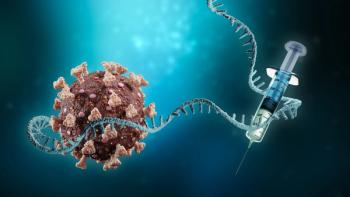
Removing the CD47 ‘Do Not Eat Me’ Sign
Gilead’s magrolimab is the leading CD47 immune checkpoint inhibitor in development.
Macrophages, which are cells that engulf or “eat” other cells, are key players in the body’s immune response. But they need some guidance. Checkpoints built into human cells keep macrophages and the immune response from going amiss. A protein called cluster of differentiation 47 (CD47) is a main checkpoint for macrophages. The presence of this marker on a cell acts as a “do not eat me” sign for macrophages.
CD47 is ubiquitous in healthy cells and overexpressed in many myeloid malignancies, including acute myeloid leukemia (AML) and myelodysplastic syndrome (MDS), as well as in solid tumors. Its presence on cancer cells allows them to evade destruction by macrophages and the innate arm of the immune system. In fact, high CD47 levels are associated with poor prognosis in several types of cancer.
Biotechnology companies are developing CD47 immune checkpoint inhibitors that have the effect of removing that “do not eat me” sign, so the immune system can gorge on cancer cells. These CD47 immune checkpoint inhibitors are candidates as treatments for several hematologic malignancies and solid tumors. Gilead Sciences, based in suburban San Francisco, is first in line among the developers with magrolimab, which is a potential first-in-class anti-CD47 monoclonal antibody.
Magrolimab by itself did not perform as well in clinical trials as it did in preclinical studies. To crank up the agent’s efficacy, Gilead is testing magrolimab in combination with Vidaza (azacitidine), a cytotoxic chemotherapy drug manufactured by Bristol Myers Squibb. The process has not gone entirely smoothly. Adverse reactions led the FDA to order a temporary halt on certain clinical trials of the combination therapy earlier this year. In June, the agency lifted that hold, and Gilead has resumed phase 3 trials of the magrolimab-Vidaza combination.
Magrolimab is also being assessed in phase 2 studies for the potential treatment of multiple myeloma, head and neck carcinoma, triple-negative breast cancer and colorectal cancer. Preliminary results from the phase 2 trials may be reported next year and in 2024.
Pfizer also has a CD47 immune checkpoint inhibitor in the works that it acquired from Toronto-based Trillium Therapeutics in 2021. Pfizer is testing the drug, temporarily named PF-07901801 (it was formerly known as TTI-622), as a treatment for several hematological malignancies.
ALX Oncology, a San Francisco-based biotechnology company, is also in the race to develop a CD47 immune checkpoint inhibitor. Its flagship product, evorpacept, is in phase 1 and 2 studies as a potential treatment for several solid tumors as well as AML, MDS and non-Hodgkin lymphoma.
Lowering anemia risk
An important goal in oncology treatment these days is to reduce toxicity and spare as many healthy cells as possible. A side effect of CD47 inhibition can be accelerated destruction of red blood cells, leading to anemia. The problem is calreticulin, a protein that beckons macrophages to engulf cells that are aged or damaged. Red blood cells do not express calreticulin when they are young but do as they age. If left unchecked, CD47 immune checkpoints can hasten the demise of older red blood cells, bringing on anemia.
The developers of the CD47 immune checkpoint inhibitors are taking steps to keep this from happening. With magrolimab, for example, an initial low dose serves as a primer to extinguish older red blood cells while bypassing younger cells that lack the calreticulin.
PF-07901801 was designed to minimally bind to red blood cells, seeking out signal regulatory protein alpha (SIRP alpha), which is absent in red blood cells.
In addition to high-affinity binding to SIRP alpha, evorpacept has an inactivated Fc domain that turns off the “eat me” signal on red blood cells.
Newsletter
Get the latest industry news, event updates, and more from Managed healthcare Executive.

























